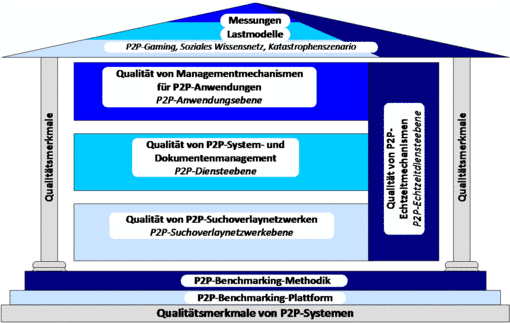QuaP2P
Note: Quap2p has ended in 2012.
The Quap2p research group investigated multilateral interdependencies as well as the characterization of peer-to-peer (p2p) quality aspects, such as performance, costs, efficiency, and validity. Therefore, a benchmark methodology for p2p systems has been developed, allowing for the investigation of the quality aspects of existing p2p systems.
The research group established a set of benchmarks in order to describe a test or a group of tests, which were designed to compare the performance of a system to other (already existing) systems. Through the utilization of benchmarking and its methodology, basic p2p mechanisms from different contemplated layers of a p2p system (see Figure) have been evaluated while also quantifying and characterizing the multilateral dependencies between the different quality aspects.

To achieve the mentioned goals, the QuaP2P contributed novel methodologies and techniques for (1) a more objective assessment of the qualitative comparability of p2p mechanisms and for (2) a quantitative evaluation of them. Moreover, resulting from the tight composition and interaction of the diverse application scenarios (gaming, search overlays, monitoring, etc.), system wide statements have been established on order to deal with (3) the general selection and (4) the concrete parameterization of the single mechanisms. Other long-term objectives of the research project answered the questions (5) in which areas a p2p system outperforms a centralized solution, (6) how this influences the systematic development of such systems and (7) which applications can be set up on top of P2P architectures.
The real-time systems lab focused on the investigation of validity and consistency in p2p mechanisms. Furthermore, the lab established an overall benchmarking methodology in order to assess the quality of p2p-based applications.
Related Dissertations
- K. Saller: "Model-Based runtime adaptation of resource constrained devices.", Technische Universität Darmstadt, 2015, URL: https://tuprints.ulb.tu-darmstadt.de/4322/.
- P. Mukherjee: "A Fully Decentralized, Peer-To-Peer Based Version Control System", Technische Universität Darmstadt, 2011, URL: http://tuprints.ulb.tu-darmstadt.de/2488/.



